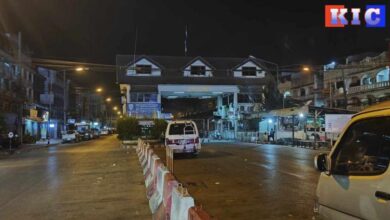Border Crisis: No relief in sight

Teachers in central Karen state had to close their schools when they heard the Burma army were attacking villages in the area. Teacher, Saw Nway Oo, taught primary school at Kwee Ta Eu village until the soldiers fired heavy mortar and artillery shells into the village.
“We had to run from our school. We had just rebuilt the school. It was well built, we used good, solid wood and it was only a year old. Now it’s gone.”
The villagers from Kwee Ta Eu were not the only ones attacked. Saw Nway Oo said his village joined with people from seven other villages to make the strenuous trek to safety on the Thai Burma border.
Saw Yan, an official from the Committee for Displaced Karen People said over a 1,500 villagers had to hide in the jungle for two weeks before setting out for the border. Villagers say they had trouble with sanitation, feeding, shelter and security.
“It was a logistical nightmare. The people hid in groups of 60, 70. They had to sleep in the open. They relied on unboiled river water. Their food ran out, there were no toilets, children had to do without food for days.”
Saw Yan said the Burma army soldiers arrested desperate villagers who ventured out from the safety of their jungle hiding places to supplement their meagre supplies with roots and jungle plants.
“They were lucky just to be arrested – two villagers seen with a homemade hunting gun were shot at by soldiers, one was wounded, captured and then shot dead. The other villager was arrested and forced to porter for the soldiers, he was later tortured to death.”
The CIDKP are a humanitarian organization that works with displaced Karen communities to assess what assistance they need. Currently CIDKP supply relief to 20,000 displaced villagers in Karen state.
Min Thar, a primary school student said he was terrified of what the Burma army might do to him.
“The soldiers shoot people. I’m scared, but I’m also angry because they destroyed our school. I liked our school.”
Min Thar, 11, says he wants to be a teacher when he grows up.
“I don’t want to be a soldier, I don’t like guns…I only like pens. I liked to complete my studies.”
After two weeks of hiding in the jungle, the displaced people made their way to Hser Poe Kee, a hiding site on the Burma side of the Thai border. The site is basic – people try to keep out of the hot sun under small makeshift shelters. People have to rely on river water for drinking, washing and cooking. The village head said the people are not receiving much in the way of donated assistance.
“We only get some rice, we get nothing else, not even salt, chilli, oil or fish paste. It’s hard on the families to feed themselves. The people can’t find work to earn money. They have to forage for roots until their small plots of vegetables grow.”
Saw Way Say, 39, has been a teacher for more than 17 years.
“I was the only teacher in my school. I had 36 students, I have been teaching alone for seven to eight years. It’s stable situation for the students. The attacks have disrupted our schedule, we have to restart right from the beginning.”
Saw Yan says the situation for the villagers is unpredictable.
“We don’t know how long they will have to stay here. They can’t go back, there are landmines and the Burma army soldiers. They only have a small supply of donated rice, it won’t last more than a month. The big question for them is what do they do next? They have a future, but it is bleak.”




